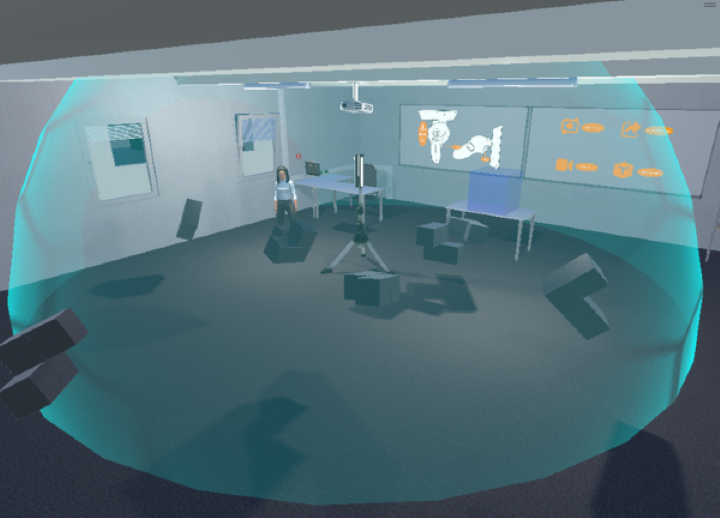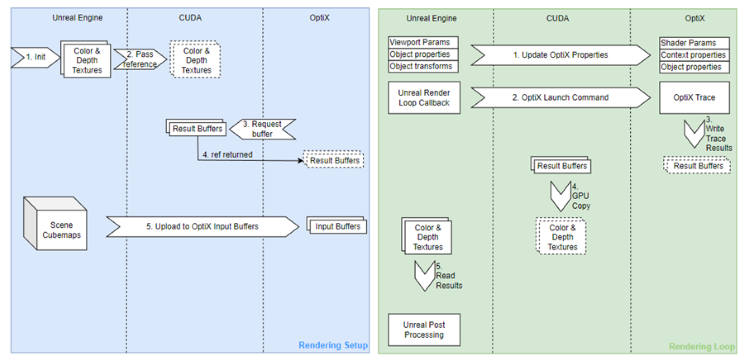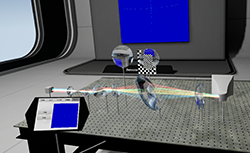Profile

|
David Gilbert, M.Sc. |
Publications
PASCAL - A Collaboration Technique Between Non-Collocated Avatars in Large Collaborative Virtual Environments

Collaborative work in large virtual environments often requires transitions from loosely-coupled collaboration at different locations to tightly-coupled collaboration at a common meeting point. Inspired by prior work on the continuum between these extremes, we present two novel interaction techniques designed to share spatial context while collaborating over large virtual distances. The first method replicates the familiar setup of a video conference by providing users with a virtual tablet to share video feeds with their peers. The second method called PASCAL (Parallel Avatars in a Shared Collaborative Aura Link) enables users to share their immediate spatial surroundings with others by creating synchronized copies of it at the remote locations of their collaborators. We evaluated both techniques in a within-subject user study, in which 24 participants were tasked with solving a puzzle in groups of two. Our results indicate that the additional contextual information provided by PASCAL had significantly positive effects on task completion time, ease of communication, mutual understanding, and co-presence. As a result, our insights contribute to the repertoire of successful interaction techniques to mediate between loosely- and tightly-coupled work in collaborative virtual environments.
@article{Gilbert2025,
author={D. {Gilbert} and A. {Bose} and T. {Kuhlen} and T. {Weissker}},
journal={IEEE Transactions on Visualization and Computer Graphics},
title={PASCAL - A Collaboration Technique Between Non-Collocated Avatars in Large Collaborative Virtual Environments},
year={2025},
volume={31},
number={5},
pages={1268-1278},
doi={10.1109/TVCG.2025.3549175}
}
Game Engines for Immersive Visualization: Using Unreal Engine Beyond Entertainment

One core aspect of immersive visualization labs is to develop and provide powerful tools and applications that allow for efficient analysis and exploration of scientific data. As the requirements for such applications are often diverse and complex, the same applies to the development process. This has led to a myriad of different tools, frameworks, and approaches that grew and developed over time. The steady advance of commercial off-the-shelf game engines such as Unreal Engine has made them a valuable option for development in immersive visualization labs. In this work, we share our experience of migrating to Unreal Engine as a primary developing environment for immersive visualization applications. We share our considerations on requirements, present use cases developed in our lab to communicate advantages and challenges experienced, discuss implications on our research and development environments, and aim to provide guidance for others within our community facing similar challenges.
@article{10.1162/pres_a_00416,
author = {Krüger, Marcel and Gilbert, David and Kuhlen, Torsten W. and Gerrits, Tim},
title = "{Game Engines for Immersive Visualization: Using Unreal Engine Beyond Entertainment}",
journal = {PRESENCE: Virtual and Augmented Reality},
volume = {33},
pages = {31-55},
year = {2024},
month = {07},
abstract = "{One core aspect of immersive visualization labs is to develop and provide powerful tools and applications that allow for efficient analysis and exploration of scientific data. As the requirements for such applications are often diverse and complex, the same applies to the development process. This has led to a myriad of different tools, frameworks, and approaches that grew and developed over time. The steady advance of commercial off-the-shelf game engines such as Unreal Engine has made them a valuable option for development in immersive visualization labs. In this work, we share our experience of migrating to Unreal Engine as a primary developing environment for immersive visualization applications. We share our considerations on requirements, present use cases developed in our lab to communicate advantages and challenges experienced, discuss implications on our research and development environments, and aim to provide guidance for others within our community facing similar challenges.}",
issn = {1054-7460},
doi = {10.1162/pres_a_00416},
url = {https://doi.org/10.1162/pres\_a\_00416},
eprint = {https://direct.mit.edu/pvar/article-pdf/doi/10.1162/pres\_a\_00416/2465397/pres\_a\_00416.pdf},
}
Poster: Virtual Optical Bench: A VR Learning Tool For Optical Design

The design of optical lens assemblies is a difficult process that requires lots of expertise. The teaching of this process today is done on physical optical benches, which are often too expensive for students to purchase. One way of circumventing these costs is to use software to simulate the optical bench. This work presents a virtual optical bench, which leverages real-time ray tracing in combination with VR rendering to create a teaching tool which creates a repeatable, non-hazardous, and feature-rich learning environment. The resulting application was evaluated in an expert review with 6 optical engineers.
» Show BibTeX
@INPROCEEDINGS{Pape2021,
author = {Pape, Sebastian and Bellgardt, Martin and Gilbert, David and König, Georg and Kuhlen, Torsten W.},
booktitle = {2021 IEEE Conference on Virtual Reality and 3D User Interfaces Abstracts and Workshops (VRW)},
title = {Virtual Optical Bench: A VR learning tool for optical design},
year = {2021},
volume ={},
number = {},
pages = {635-636},
doi = {10.1109/VRW52623.2021.00200}
}

